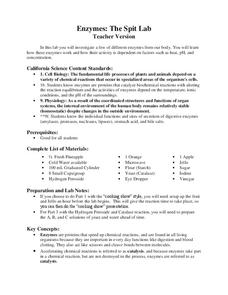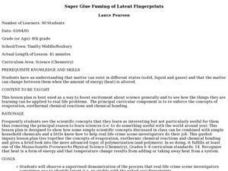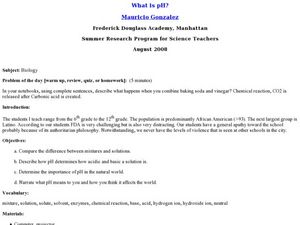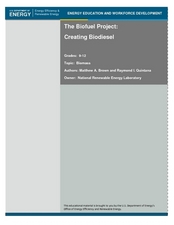Biology Junction
Photosynthesis: Energy and Life
All life requires energy ... and the connection between energy and plant life typically requires photosynthesis. Scholars explore photosynthesis in depth from ATP/ADP through the Calvin cycle. A helpful presentation highlights concepts...
Curated OER
Batteries
In this battery worksheet, students answer 14 questions about primary cell batteries, secondary cell batteries, and how batteries are charged. They calculate the rates of discharge for given batteries.
Curated OER
IPC Chemistry Review
In this chemistry review activity, high schoolers classify and name compounds, calculate atomic mass, draw Lewis Dot Diagrams, and determine number of protons for atoms. This activity has 37 fill in the blank, 38 matching, and 3 short...
Curated OER
The Influence of Initiator Concentration on the Molecular Weight of Polystyrene
This in-depth organic chemistry lab walks learners through an investigation of the effect of initiator concentration on the resulting molecular weight of polystyrene. It is important that you use this instructional activity with...
Serendip
How Do Biological Organisms Use Energy?
When an organism eats, how does food become energy? Young biologists follow glucose through the process of cellular respiration to the creation of ADP using a discussion-based activity. The resource also highlights conservation of mass...
Cornell University
Bacteria Take Over and Down
Bacteria outnumber all other forms of life on Earth. Scholars observe the growth of bacteria in petri dishes to understand their role in maintaining good health. Then, they observe the growth of bacteria after they introduce...
Virginia Department of Education
Aspirin Analysis
Laughter may be the best medicine, but aspirin is also important. Young chemists analyze aspirin tablets using titration in this lab experiment. They then repeat the entire experiment using a different aspirin brand.
LABScI
Enzymes: The Spit Lab
Enzymes in our bodies each have a job to do. Learn the factors that affect the activity of some enzymes using the third activity of an informative 12-part biology series. A three-part laboratory activity asks teams to investigate how...
Virginia Department of Education
Soap, Slime, and Creative Chromatography
Do you think chromatography paper suffers from separation anxiety? Young chemists make soap, slime, silly putty, and experiment with chromatography in this instructional activity. The material includes clear instructions for each...
Biology Junction
Macromolecules
In chemistry, organic means something contains a carbon base. A helpful presentation starts by defining macromolecules as large organic carbon molecules. Scholars answer questions about each topic on the associated worksheet. It covers...
Curated OER
Intrinsic Viscosity
Students treat a high molecular weight polyvinyl alcohol polymer with potassium periodate. They measure the viscosity of polyvinyl alcohols.
Teach Engineering
Making Model Microfluidic Devices Using JELL-O
Nothing flows like J-E-L-L-O! In the final portion of a four-part series, pupils create scale models of microfluidic devices out of gelatin and bendable straws. They use their devices to test various flow rates in the delivery of...
Curated OER
Art Nouveau
Students study the design elements of Art Nouveau, its sources and development. They create art projects in ceramics and glass that exemplify the focus of Art Nouveau as a decorative style.
Curated OER
Super Glue Fuming of Latent Fingerprints
Students explore latent fingerprinting. They observe a supervised demonstration of the process that real-life crime scene investigators sometimes use to identify latent fingerprints. In addition, they brainstorm ways to improve the...
Curated OER
What is pH?
Students describe pH and the importance of it in the natural world. In this Biology lesson students compare the pH of different mixtures.
Curated OER
Chemistry
In this chemistry worksheet, students describe an atom, its parts, the charges of these parts, and atoms life functions. Then they explain what the octet rule states for the placements of electrons around the nucleus of an atom. Students...
Curated OER
How Genes Work Lesson Plan
Students define the key terms that are the structure and function of DNA. In this genetics lesson plan students complete a lab activity in which they construct a model DNA structure.
Curated OER
Reading Comprehension Worksheet: Compounds & Elements
In this reading comprehension worksheet, students read several short paragraphs about compounds and elements and then answer several questions about the text.
Curated OER
Enzymes
This multiple-choice and short-answer enzyme quiz would work well as a pre-post test in any biology class. To differentiate, use it as a group quiz with learners paired up to discuss each question.
Curated OER
Ozone Tag
Seventh graders explain the role of stratospheric ozone and predict at least three ways in which depleted ozone would change her/his lifestyle. They then describe the process by which chlorine or bromine compounds can break down ozone...
Curated OER
WHAT MAKES A LIGHT BULB LIGHT?
Young scholars are able to use inquiry to answer the essential questions. They are able to predict and test configurations of a battery, bulb, and wire that make the complete circuit. Students craft a group and individual theory of a...
Curated OER
The Bio-fuel Project: Creating Bio-diesel
Students investigate bio-fuel. In this investigative lesson, students create bio-fuel from vegetable oil waste. Students will analyze, predict, collect and synthesize data from their experiments with bio-fuel.
Curated OER
Simple Organic Compounds
In this organic compounds activity, students read about the development of chlorofluorocarbons and the breakdown of this compound in the atmosphere. Students complete 2 short answer questions.
Curated OER
Molecular Models of Functional Groups
In this molecular model worksheet, students use a molecular model kit to construct 13 different molecule models. After constructing the molecules, the students complete 32 short answer questions.

























